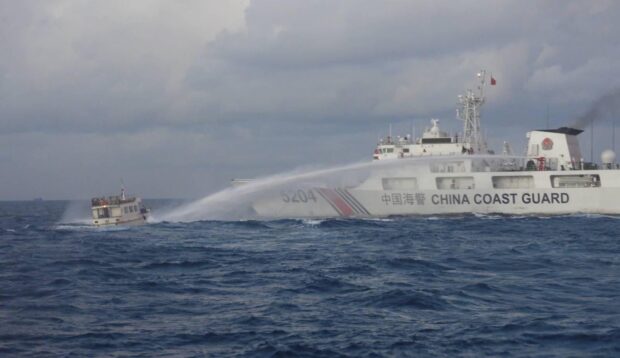ASEAN told to speak with one voice vs China

A Chinese military vessel fires water cannon at Philippine boat M/L Kalayaan during a resupply mission in Ayungin (Second Thomas) Shoal in the West Philippine Sea on Dec. 10, 2023. The boat had to be towed back to port without completing its mission due to significant damage from the attack. PHOTO FROM PCG
MANILA, Philippines—Southeast Asian nations should set aside differences and speak in one voice against China’s aggression in South China Sea to protect their interests and preserve regional stability, according to Japanese political experts.
The Association of Southeast Asian Nations (ASEAN)— a 10-member regional bloc which includes the Philippines, Vietnam, Malaysia Brunei, Cambodia, Indonesia, Laos, Myanmar, Singapore and Thailand— remained at odds on how to respond to China’s territorial claims in the disputed waters.
“China can be pressured into thinking that they need to be careful when they deal with Southeast Asian nations if you cooperate, if you unite, if you get your voices together,” said Akio Takahara, a Graduate School for Law and Politics professor at the University of Tokyo who specializes in Chinese politics and diplomacy.
The Inquirer recently sat down with Japanese political experts as part of a program on Japan’s security situation in East Asia upon the invitation of Japan’s Ministry of Foreign Affairs.
Takahara recalled ASEAN’s response at a regional forum when China occupied Panganiban (Mischief) Reef in 1995, when its foreign ministers protested the action but avoiding mention of Beijing. This, however, caught China off guard and could have spurred a noticeable change in its attitude.
Panganiban Reef, which is within the Philippines’ exclusive economic zone, has since been transformed by China into one of its largest military outposts in the Spratlys.
Takahara said ASEAN member states should unite and find common ways to deal with China, not to fight it, but “to coexist and realize your respective interests peacefully.”
Tsutomu Kikuchi, International Relations professor at Aoyama Gakuin University, said ASEAN would gain more respect from China if it collectively demonstrates a tougher stance on issues like South China Sea.
He said ASEAN does not openly support the 2016 South China Sea ruling in favor of the Philippines that rejected China’s excessive claims in the disputed waters.
“If ASEAN is seriously concerned about maintaining rules-based international order, they should support the decision. Of course, this may cause some problems with China, but it’s a cost that must be shared by ASEAN countries,” he said.
A collective response would “reduce tensions” and avoid individual intervention by China, Kikuchi said. Beijing could target individual countries that attempt to stand up to it, he said.
At present, ASEAN appears to be unwilling to pay the price in performing its central role in Southeast Asia, especially in dealing with China, he pointed out.
ASEAN should also get international support through bilateral meetings or summits with other countries, including those in the European Union, he said.
China claims almost the entire resource-rich South China Sea. Claimants in the ASEAN include the Philippines, Vietnam, Malaysia and Brunei.
The latest back-to-back harassment by Chinese ships of Philippine vessels in the West Philippine Sea over the weekend won support for the Philippines from the international community but was met by silence from ASEAN.
For comprehensive coverage, in-depth analysis, visit our special page for West Philippine Sea updates. Stay informed with articles, videos, and expert opinions.